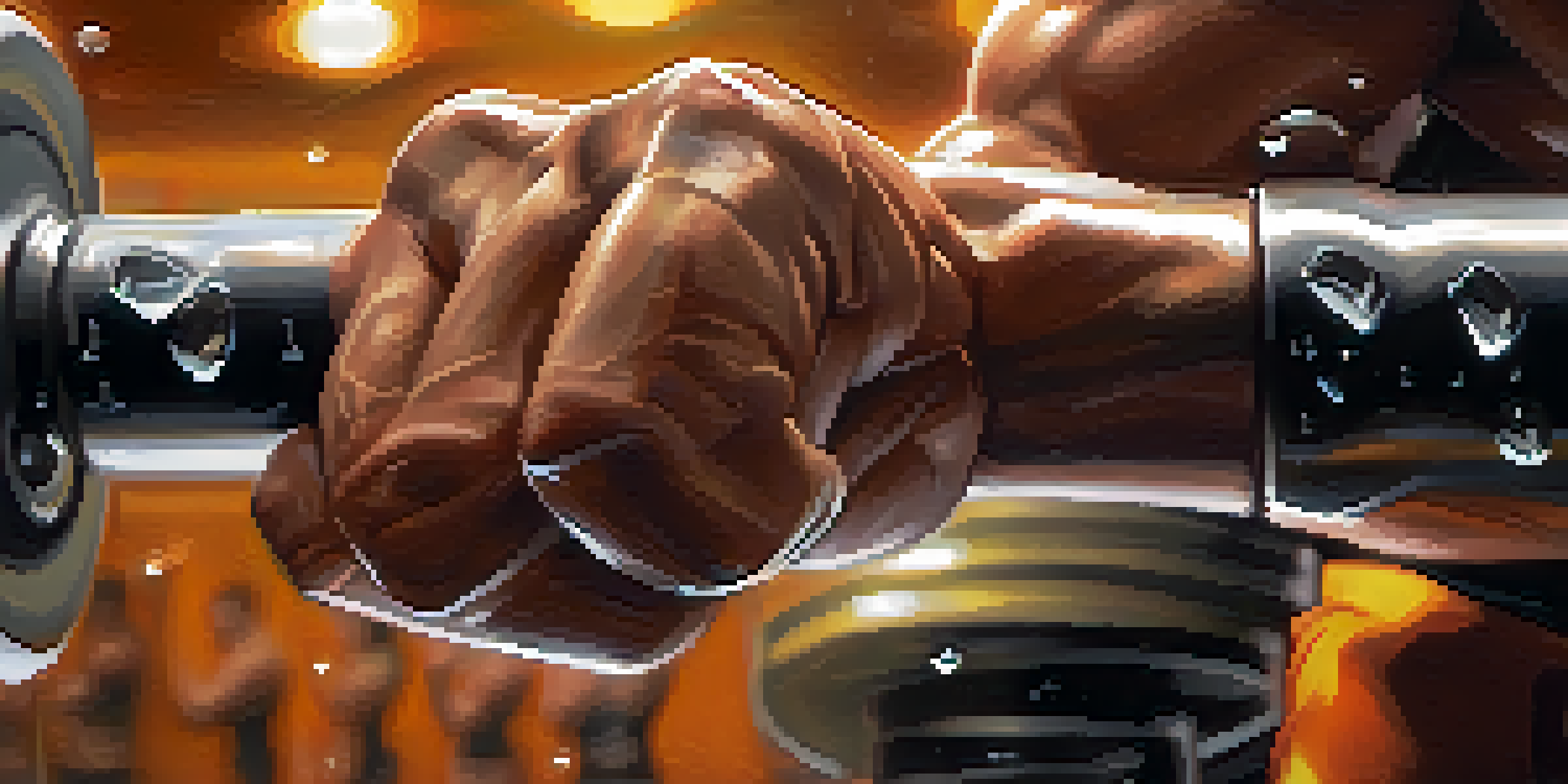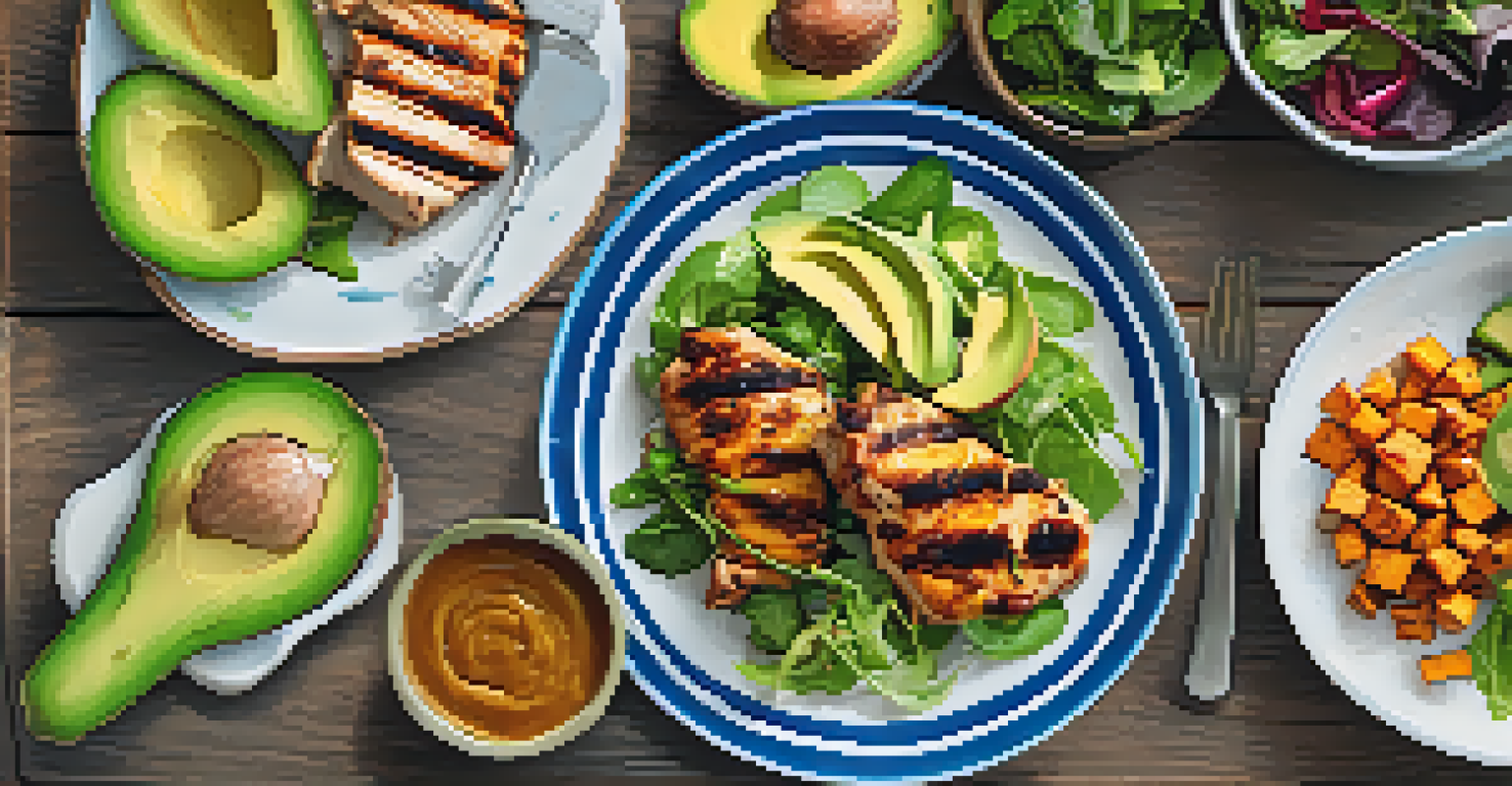The Impact of Nutrition on Martial Arts Recovery Processes

Understanding Recovery in Martial Arts
Recovery in martial arts involves healing both the body and mind after intense training or competition. It’s a critical phase that allows athletes to regain strength, flexibility, and mental focus. Effective recovery can lead to improved performance in future training sessions and competitions.
The body is a temple, but only if you treat it as one.
After a bout of sparring or a grueling workout, martial artists face muscle fatigue, minor injuries, and mental exhaustion. This is where nutrition plays a pivotal role. By providing the right nutrients, athletes can speed up their recovery process and minimize downtime.
Incorporating proper recovery strategies, including nutrition, can be the difference between an athlete’s peak performance and an injury setback. Understanding how nutrition impacts recovery is essential for anyone serious about martial arts.
The Role of Macronutrients in Recovery
Macronutrients—carbohydrates, proteins, and fats—are the building blocks of recovery. Carbohydrates replenish glycogen stores, which are depleted during intense training, while proteins help repair and build muscle tissue. Fats also play a role by providing essential fatty acids necessary for overall health.

For example, after an intense session, a martial artist might enjoy a meal of grilled chicken, sweet potatoes, and avocado. This combination provides a perfect balance of protein, carbs, and healthy fats, which can significantly aid in recovery. Timing is also crucial; consuming these nutrients soon after training can enhance their effectiveness.
Recovery Combines Body and Mind
Effective recovery in martial arts involves healing both physically and mentally to enhance future performance.
Balancing these macronutrients is key. While protein might take the spotlight for muscle repair, carbohydrates are equally important for energy restoration. A well-rounded diet ensures that martial artists can recover promptly and effectively.
Hydration: A Pillar of Recovery
Hydration is often overlooked but is essential for effective recovery. Water helps transport nutrients throughout the body, regulates temperature, and supports metabolic processes. During training, martial artists can lose significant fluids through sweat, making it crucial to rehydrate afterward.
Take care of your body. It's the only place you have to live.
Inadequate hydration can lead to fatigue, decreased coordination, and increased risk of injury. A simple way to assess hydration levels is to check the color of urine; pale yellow indicates good hydration while darker shades suggest a need for more fluids. Electrolyte-rich drinks can also be beneficial, especially after intense sessions.
By prioritizing hydration, martial artists can enhance their recovery and overall performance. Remember, staying hydrated is not just about drinking water; it’s about replenishing what’s lost during training.
Vitamins and Minerals: The Unsung Heroes
Vitamins and minerals play a crucial role in recovery but often get overshadowed by macronutrients. These micronutrients assist in metabolic processes, immune function, and muscle contraction. For instance, Vitamin C aids in collagen formation, which is vital for joint health, while magnesium supports muscle recovery and reduces cramps.
Incorporating a variety of fruits and vegetables into a martial artist's diet can ensure an adequate intake of these essential nutrients. For example, leafy greens, berries, and citrus fruits not only provide vitamins but also antioxidants, which help combat oxidative stress caused by intense training.
Macronutrients Drive Recovery Success
Carbohydrates, proteins, and fats are essential for replenishing energy, repairing muscles, and supporting overall health post-training.
While it might be tempting to rely on supplements, a whole-foods approach is generally more effective. Whole foods contain a complex array of nutrients that work synergistically to support recovery, making them more beneficial than isolated supplements.
Rest and Sleep: Nutrition's Best Friends
Nutrition and rest go hand in hand when it comes to recovery. After a training session, the body needs sleep to repair itself. During deep sleep, growth hormone levels increase, promoting muscle recovery and growth.
Eating a balanced meal before bed can also help improve sleep quality. Foods rich in tryptophan, such as turkey and bananas, can boost serotonin levels, which in turn helps regulate sleep patterns. A good night’s sleep not only aids recovery but also enhances performance in the gym.
Incorporating practices like a bedtime routine and reducing screen time before sleep can also improve recovery outcomes. Nutrition is just one part of the equation; ensuring a holistic approach that includes rest and recovery is essential for martial artists.
Food Timing: The Recovery Game Changer
The timing of food intake can significantly impact recovery. Consuming a meal or snack within 30 minutes post-training can enhance muscle repair and glycogen replenishment. This window is often referred to as the 'anabolic window' where the body is primed to absorb nutrients.
For martial artists, this could mean having a protein shake or a balanced meal ready to go immediately after practice. This strategy not only aids recovery but also sets the stage for a more productive training session next time. Pairing proteins with carbohydrates during this time can be particularly effective.
Hydration is Key for Recovery
Staying properly hydrated after training helps transport nutrients, regulate body temperature, and minimize the risk of injury.
Understanding food timing can help martial artists optimize their recovery strategies. By planning meals and snacks around training sessions, athletes can ensure they’re getting the most out of their nutrition.
Personalizing Nutrition for Individual Needs
Just as every martial artist has unique training styles and goals, their nutritional needs vary as well. Factors such as age, body composition, and training intensity all play a role in determining dietary requirements. It's essential for athletes to listen to their bodies and adjust their nutrition accordingly.
For example, a fighter in a weight class might need to be more conscious of their caloric intake compared to someone focusing on strength training. Consulting with a sports nutritionist can provide valuable insights tailored to individual needs, helping to create a customized nutrition plan.

Personalizing nutrition not only enhances recovery but also boosts overall performance. By understanding their unique requirements, martial artists can fuel their bodies effectively and achieve their goals.